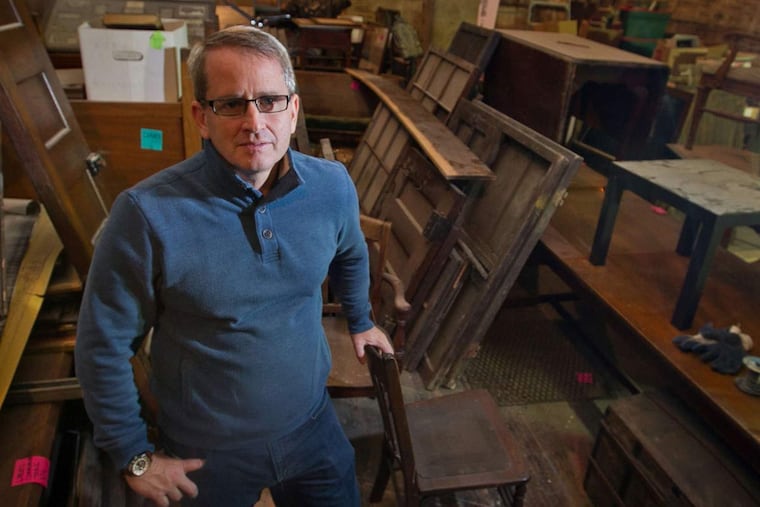New life for a church that dates to William Penn's day
It looks like a movie set from National Treasure, a dusty church-basement gym crammed with boxes, bureaus, mirrors, and paintings.

It looks like a movie set from National Treasure, a dusty church-basement gym crammed with boxes, bureaus, mirrors, and paintings.
There's no hidden map, but perhaps a future treasure:
The plan is to turn the old gym, with its worn backboards and broken hoops, into a multiservice center to help the city's homeless, offering meals, showers, bathrooms, mental-health care, legal advice, and more at a Center City religious landmark.
"We want to provide a place where all the different types of ministerial services we have available, our folks, and in the community and partner ministries, come together and provide services," said the Rev. Mike Harder, a pastor at Liberti Church.
The Engagement Center is planned as part of a huge renovation that springs from an unusual tenant-landlord alliance between two Philadelphia churches, one young and growing and needing to expand, the other old and shrunken and seeking a new way forward.
Liberti Church, formerly a tenant in the grand First Baptist Church at 17th and Sansom, bought the building last year, as financial pressures pushed the Baptist institution toward a sale. The agreement specified that First Baptist worshipers would get new chapel space inside.
First Baptist, down to about 80 members and struggling to maintain a 115-year-old, 800-seat cathedral, became a tenant in what had been its home.
That deal headed off a sale to a developer who intended to turn the building into high-end, boutique shopping space. While First Baptist would have kept a small worship area, it would have meant the end for the building's ornate sanctuary, which was based on the sixth-century Hagia Sophia basilica in Istanbul, Turkey.
The idea between churches was "we'd continue the partnership, just reverse some roles," said the Rev. Pete Wool, pastor of First Baptist. "We tried to be extremely gracious hosts to Liberti, and Liberti is trying to be extremely gracious hosts to us."
The arrangement reflects a trend that's occurring in cities across the country: As congregations wane and consolidate, old neighborhood churches are disappearing, some turned into houses or shopping venues and others knocked down for new construction.
In Philadelphia, the old Wissahickon Methodist Episcopal Church became the Terrace Street condos, and the Rothschild Memorial Synagogue is now the Older Adult Sunshine Center.
Demolition is a more common outcome, as economic and demographic changes have caused dozens of closures and mergers in the last decade, according to the Philadelphia Church Project.
"All denominations are struggling with how to survive in increasingly unforgiving environments," said Patrick Hildebrandt, who runs the project, which studies the city's religious structures.
Those changes put First Baptist in a situation that once seemed unimaginable.
The church formed in 1698, six years after William Penn founded Philadelphia. It became a center of the abolitionist movement, and in the 1800s a force for the creation of Lewisburg College, later renamed Bucknell University in honor of William Bucknell, a trustee of both the school and First Baptist.
The steel and brownstone building at 17th and Sansom opened in 1900, its design including a gym as part of a health-first philosophy developed by Michigan doctor John Harvey Kellogg, best known for inventing cornflakes.
By World War II the church was wealthy in funds and reputation. But the postwar years saw early signs of decline, as people moved to the suburbs. That accelerated as younger couples left the city in search of better schools.
In recent years, First Baptist struggled to keep the heat and lights on, to keep the building open for services and for the half-dozen support groups that meet there.
When developer James Pearlstein offered $2 million, the members prepared to sell, telling tenant Liberti that its church would need to move. Then the younger church made an offer: It would match the $2 million purchase price, and raise $10 million for renovations.
For First Baptist, knowing the building would remain a church was important.
"It's been hard emotionally, to see somebody else run a building that we've been in for a long, long time," said Mary Lynn Williams, chair of the First Baptist trustees, and a member for more than 30 years. "But overall it's good. We can now concentrate on doing ministry rather than figuring out how to pay the light bill."
Liberti Church launched in Center City in 2009, and maintains a second campus in Rosemont. Its members tend to be better off and younger, in their 20s and 30s.
Liberti has scheduled a grand opening at 17th and Sansom for Dec. 6. First Baptist expects to move into its chapel in January.
"There's things happening now and will happen in the near future," Harder said.
Installation of new bathrooms, heating, plumbing, and an elevator marks the first phase of renovation. The second phase includes the gym, which will provide homeless people not only with food but assistance with everything from job-hunting to replacing lost IDs.
The need is plain. Last week, the blankets and bags of homeless people were piled against the front doors of the church.
Inside the building, the clatter and calls of construction workers echoed across the sanctuary.
"It would have been very sad if they would have had to sell to a developer," Harder said. "We feel a high level of responsibility to the people we're trying to minister to - but also to the people of Philadelphia with this historic sacred space."
215-854-4906@JeffGammage